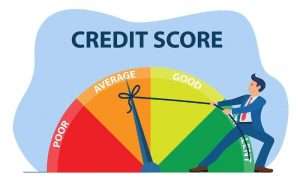Credit reporting and repair are two essential tools that can help you manage and improve your credit score.
Credit Reporting is the process of collecting, analyzing, and maintaining information about your credit history whereas Credit Repair refers to the process of improving your credit score.
In this article, we will explore the world of credit reporting and credit repair. We’ll explain how credit reporting works, what affects your credit score, and how you can repair your credit to achieve financial freedom.
By the end of this guide, you’ll have a better understanding of your credit score and what you can do to take control of it.

What is Credit Reporting?
Credit Reporting is the process of collecting, analyzing, and maintaining information about your credit history.
It is generally done by Credit reporting agencies, also known as Credit Bureaus, such as Equifax, Experian, and TransUnion. They collect information about your credit history from various sources such as lenders, creditors, and public records, to create a credit report that summarizes your credit history.
This information includes your credit card and loan balances, payment history, and other financial information.
Once the credit reporting agencies have collected this information, they use it to calculate your credit score. Your credit score is a three-digit number that ranges from 300 to 850. The higher your credit score, the more creditworthy you are.
How Does Credit Reporting Work?
Credit reporting works by collecting information about your credit history from various sources, including lenders and other financial institutions. This information is then used to calculate your credit score.
Your credit score is calculated using a complex algorithm that takes into account several factors, including your payment history, credit utilization, length of credit history, and types of credit used.
Your credit score is then used by lenders and other financial institutions to determine whether or not to approve your application for credit, such as a credit card or loan. A high credit score can make it easier to get approved for credit, while a low credit score can make it harder.
Common Credit Reporting Myths
- Checking your credit report will harm your credit score. This is false, as checking your credit report is considered a “soft” inquiry and doesn’t harm your credit score.
- Closing credit cards will improve your credit score. This is false, as closing credit cards can harm your credit score by reducing your overall available credit and decreasing the average age of your accounts.
- Your income affects your credit score. This is false, as your credit score is based on your credit history and doesn’t take into account your income or employment status.
Read More: 5 Simple Steps to Boost Your Credit Score
What is Credit Repair?
Credit Repair is the process of improving your credit score. Several companies do credit repair on your behalf.
Also, this can be done by yourself by addressing errors on your credit report, paying off outstanding debts, and taking other steps to improve your creditworthiness.
How to Repair Your Credit Yourself?
To “repair” your credit yourself, start by checking your credit score, improving your payment history, paying off your outstanding debts, and avoiding new credit. It’s a good idea to focus on resolving any inaccuracies on your credit report yourself before you pay a company to do it for you.
Credit repair companies can’t do anything that you can’t do on your own for free. Credit repair companies work on your behalf to remove & dispute any negative information and financial errors by communicating with credit bureaus (Experian, Equifax, and TransUnion) and/or financial companies like your bank or a debt collector.
There are several steps you can take to repair your credit, including:
#1. Check Your Credit Report
The first step in credit repair is to check your credit report for errors. You can request a free copy of your credit report from each of the three major credit reporting agencies once a year. Review your credit report carefully and dispute any errors you find.
#2. Pay Off Outstanding Debts
One of the most effective ways to improve your credit score is to pay off outstanding debts. This can include credit card balances, personal loans, and other debts. Make sure to prioritize paying off high-interest debts first.
#3. Build a Positive Credit History
Another way to improve your credit score is to build a positive credit history. This can be done by making timely payments on your debts and avoiding late payments. It can also be helpful to keep your credit card balances low and to avoid opening new credit accounts unnecessarily.
#4. Consider Credit Counseling
If you’re struggling with debt, credit counseling can be a helpful option. Credit counseling can help you develop a debt repayment plan and provide you with tools and resources to help you manage your debt and improve your credit score.
KEY TAKEAWAYS
- Your credit score is a reflection of your creditworthiness.
- Credit reporting agencies collect and maintain credit information on individuals and businesses.
- Your credit report includes information about your payment history, outstanding debts, and credit utilization.
- Credit repair involves disputing inaccurate or incomplete information on your credit report.
- You can dispute errors on your credit report yourself or hire a credit repair company.
- Improving your credit score takes time and effort, but it’s possible with good financial habits.
The Bottom line
Credit reporting and repair are two essential tools that can help you manage and improve your credit score. By understanding credit repair and how credit reporting works, you can take steps to ensure that your credit report is accurate and up to date.
By taking steps to repair your credit, such as paying off outstanding debts and building a positive credit history, you can improve your creditworthiness and increase your chances of getting approved for credit in the future.
The Invest Freak is not a financial advisor, so it’s best to consult a professional for help repairing your credit.
Best Credit Repair Companies in the US
1. THE CREDIT PROS
2. CREDIT SAINT
3. TRADELINE
4. SKY BLUE CREDIT
5. COAST TRADELINES
FAQs – Credit Reporting and Repair
How often should you check your credit report?
It’s recommended that you check your credit report at least once a year to ensure that all the information is accurate and up-to-date. You can request a free credit report from each of the three credit reporting agencies once a year.
What is a good credit score?
A good credit score is generally considered to be 670 or above. However, some lenders may have different criteria for what they consider to be a good credit score.
How can you build credit if you have no credit history?
If you have no credit history, you can start building credit by getting a secured credit card or becoming an authorized user on someone else’s credit card. You can also consider getting a credit-builder loan or taking out a small personal loan.
Can you remove accurate information from your credit report?
No, you cannot remove accurate information from your credit report. The information on your credit report reflects your credit history, whether positive or negative.
How long does negative information stay on your credit report?
Most negative information stays on your credit report for 7 years, although some information such as bankruptcy can stay on for up to ten years.
Can credit repair companies help me improve my credit score?
YES! Credit repair companies can help address errors on your credit report and guide you through the credit repair process. However, it’s important to choose a reputable company and to be cautious of scams.
How long does it take to repair my credit?
The length of time it takes to repair your credit will depend on your individual circumstances. Improving your credit score can take several months or even years, depending on the severity of your credit issues.
Will paying off my debts automatically improve my credit score?
Paying off your debts can certainly help improve your credit score, but it may not be enough on its own. Other factors, such as your payment history and credit utilization, can also impact your credit score.
How often should I check my credit report?
It’s a good idea to check your credit report at least once a year to make sure that all of the information on it is accurate. You may also want to check your credit report more frequently if you’re actively working on improving your credit score.
What are the Best Credit Repair Companies in the US?
Here is the list of the best credit repair companies:
1. THE CREDIT PROS
2. CREDIT SAINT
3. TRADELINE
4. SKY BLUE CREDIT
5. COAST TRADELINES


